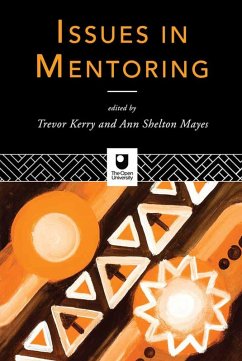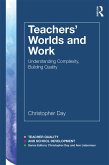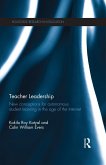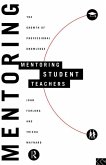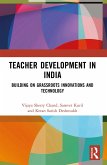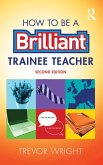34,95 €
34,95 €
inkl. MwSt.
Sofort per Download lieferbar

17 °P sammeln
34,95 €
Als Download kaufen

34,95 €
inkl. MwSt.
Sofort per Download lieferbar

17 °P sammeln
Jetzt verschenken
Alle Infos zum eBook verschenken
34,95 €
inkl. MwSt.
Sofort per Download lieferbar
Alle Infos zum eBook verschenken

17 °P sammeln
- Format: PDF
- Merkliste
- Auf die Merkliste
- Bewerten Bewerten
- Teilen
- Produkt teilen
- Produkterinnerung
- Produkterinnerung

Bitte loggen Sie sich zunächst in Ihr Kundenkonto ein oder registrieren Sie sich bei
bücher.de, um das eBook-Abo tolino select nutzen zu können.
Hier können Sie sich einloggen
Hier können Sie sich einloggen
Sie sind bereits eingeloggt. Klicken Sie auf 2. tolino select Abo, um fortzufahren.

Bitte loggen Sie sich zunächst in Ihr Kundenkonto ein oder registrieren Sie sich bei bücher.de, um das eBook-Abo tolino select nutzen zu können.
Designed to accompany the Open University MA module in mentoring, this guide offers access to the latest research in this area.
- Geräte: PC
- mit Kopierschutz
- eBook Hilfe
- Größe: 10.71MB
Andere Kunden interessierten sich auch für
![Teachers' Worlds and Work (eBook, PDF) Teachers' Worlds and Work (eBook, PDF)]() Christopher DayTeachers' Worlds and Work (eBook, PDF)38,95 €
Christopher DayTeachers' Worlds and Work (eBook, PDF)38,95 €![Teacher Leadership (eBook, PDF) Teacher Leadership (eBook, PDF)]() Kokila Roy KatyalTeacher Leadership (eBook, PDF)51,95 €
Kokila Roy KatyalTeacher Leadership (eBook, PDF)51,95 €![Mentoring Student Teachers (eBook, PDF) Mentoring Student Teachers (eBook, PDF)]() John FurlongMentoring Student Teachers (eBook, PDF)50,95 €
John FurlongMentoring Student Teachers (eBook, PDF)50,95 €![Organising Learning in the Primary School Classroom (eBook, PDF) Organising Learning in the Primary School Classroom (eBook, PDF)]() Joan DeanOrganising Learning in the Primary School Classroom (eBook, PDF)39,95 €
Joan DeanOrganising Learning in the Primary School Classroom (eBook, PDF)39,95 €![Teacher Development in India (eBook, PDF) Teacher Development in India (eBook, PDF)]() Vijaya Sherry ChandTeacher Development in India (eBook, PDF)41,95 €
Vijaya Sherry ChandTeacher Development in India (eBook, PDF)41,95 €![How to be a Brilliant Trainee Teacher (eBook, PDF) How to be a Brilliant Trainee Teacher (eBook, PDF)]() Trevor WrightHow to be a Brilliant Trainee Teacher (eBook, PDF)28,95 €
Trevor WrightHow to be a Brilliant Trainee Teacher (eBook, PDF)28,95 €![Teacher Induction That Works (eBook, PDF) Teacher Induction That Works (eBook, PDF)]() Tara LinkTeacher Induction That Works (eBook, PDF)25,95 €
Tara LinkTeacher Induction That Works (eBook, PDF)25,95 €-
-
-
Designed to accompany the Open University MA module in mentoring, this guide offers access to the latest research in this area.
Dieser Download kann aus rechtlichen Gründen nur mit Rechnungsadresse in A, B, BG, CY, CZ, D, DK, EW, E, FIN, F, GR, HR, H, IRL, I, LT, L, LR, M, NL, PL, P, R, S, SLO, SK ausgeliefert werden.
Produktdetails
- Produktdetails
- Verlag: Taylor & Francis eBooks
- Seitenzahl: 292
- Erscheinungstermin: 22. Juli 2014
- Englisch
- ISBN-13: 9781136159275
- Artikelnr.: 41221076
- Verlag: Taylor & Francis eBooks
- Seitenzahl: 292
- Erscheinungstermin: 22. Juli 2014
- Englisch
- ISBN-13: 9781136159275
- Artikelnr.: 41221076
- Herstellerkennzeichnung Die Herstellerinformationen sind derzeit nicht verfügbar.
Trevor Kerry, Ann Shelton Mayes
Part A: Concepts of Mentoring Introduction 1. Learning to teach and models
of mentoring Trisha Maynard and John Furlong, 2. Toward a conception of
mentoring Eugene Anderson and Anne Shannon, 3. Mentoring for teacher
development: possibilities and caveats Bob Elliott and James Calderhead,
Part B: Mentoring in initial teacher training Introduction 4. School-based
teacher education David Bridges, 5. School-led teacher training Toni
Beardon, Martin Booth, David Hargreaves and Michael Reiss, 6. The
effectiveness and role of the mentor in school: the students view Martin
Booth 7. The role of the subject mentor in further education Maurice
Rothera, Stephanie Hawkins and James Hendry 8.Mentoring in initial teacher
education Kate Jacques 9. Mentoring beginner teachers - issues for schools
to anticipate and manage Chris Watkins and Caroline Whalley, 10. A
neglected source for reflection in the supervision of student teachers
Peter Lucas, 11. The mentor connection Murray Reich Part C: Mentoring in
induction training Introduction 12. The role of mentors and teacher tutors
in school-based teacher education and induction Mike Turner, 13. Mirror,
mirror on the wall, what is the fairest scheme of all? Reflections on the
induction needs of newly qualified teachers Anne Waterhouse, 14. Key issues
emerging from an NFER study of NQT's: models of induction support Kay
Kinder and Peter Earley, 15. Initiation rights: Beginning teachers'
professional development and the objectives of induction training Peter
Earlery Part D: Mentoring and assessment Introduction 16. Standards and
quality in education Richard Pring, 17. Quality control in teacher
education Geoff Whitty, 18. Competence-based teacher education: approaches
and issues Geoff Whitty and Elizabeth Willmott, 19. Experience and
competence in further and adult education Terry Hyland, 20. The limits of
competence: a cautionary note on Circular 9/92 John Furlong, 21.
Integrating values into the assessment of teachers in initial education and
training Bob Moon and Ann Shelton Mayes,N 22. Surrey New Teacher Competency
Project Sue Gifford, Part E Mentoring: professional development and
institutional aspects Introduction 23. Mentoring as a staff development
activity Mike Kelly, Tony Beck and John Thomas, 24. Mentoring Rowie Shaw,
of mentoring Trisha Maynard and John Furlong, 2. Toward a conception of
mentoring Eugene Anderson and Anne Shannon, 3. Mentoring for teacher
development: possibilities and caveats Bob Elliott and James Calderhead,
Part B: Mentoring in initial teacher training Introduction 4. School-based
teacher education David Bridges, 5. School-led teacher training Toni
Beardon, Martin Booth, David Hargreaves and Michael Reiss, 6. The
effectiveness and role of the mentor in school: the students view Martin
Booth 7. The role of the subject mentor in further education Maurice
Rothera, Stephanie Hawkins and James Hendry 8.Mentoring in initial teacher
education Kate Jacques 9. Mentoring beginner teachers - issues for schools
to anticipate and manage Chris Watkins and Caroline Whalley, 10. A
neglected source for reflection in the supervision of student teachers
Peter Lucas, 11. The mentor connection Murray Reich Part C: Mentoring in
induction training Introduction 12. The role of mentors and teacher tutors
in school-based teacher education and induction Mike Turner, 13. Mirror,
mirror on the wall, what is the fairest scheme of all? Reflections on the
induction needs of newly qualified teachers Anne Waterhouse, 14. Key issues
emerging from an NFER study of NQT's: models of induction support Kay
Kinder and Peter Earley, 15. Initiation rights: Beginning teachers'
professional development and the objectives of induction training Peter
Earlery Part D: Mentoring and assessment Introduction 16. Standards and
quality in education Richard Pring, 17. Quality control in teacher
education Geoff Whitty, 18. Competence-based teacher education: approaches
and issues Geoff Whitty and Elizabeth Willmott, 19. Experience and
competence in further and adult education Terry Hyland, 20. The limits of
competence: a cautionary note on Circular 9/92 John Furlong, 21.
Integrating values into the assessment of teachers in initial education and
training Bob Moon and Ann Shelton Mayes,N 22. Surrey New Teacher Competency
Project Sue Gifford, Part E Mentoring: professional development and
institutional aspects Introduction 23. Mentoring as a staff development
activity Mike Kelly, Tony Beck and John Thomas, 24. Mentoring Rowie Shaw,
Part A: Concepts of Mentoring Introduction 1. Learning to teach and models
of mentoring Trisha Maynard and John Furlong, 2. Toward a conception of
mentoring Eugene Anderson and Anne Shannon, 3. Mentoring for teacher
development: possibilities and caveats Bob Elliott and James Calderhead,
Part B: Mentoring in initial teacher training Introduction 4. School-based
teacher education David Bridges, 5. School-led teacher training Toni
Beardon, Martin Booth, David Hargreaves and Michael Reiss, 6. The
effectiveness and role of the mentor in school: the students view Martin
Booth 7. The role of the subject mentor in further education Maurice
Rothera, Stephanie Hawkins and James Hendry 8.Mentoring in initial teacher
education Kate Jacques 9. Mentoring beginner teachers - issues for schools
to anticipate and manage Chris Watkins and Caroline Whalley, 10. A
neglected source for reflection in the supervision of student teachers
Peter Lucas, 11. The mentor connection Murray Reich Part C: Mentoring in
induction training Introduction 12. The role of mentors and teacher tutors
in school-based teacher education and induction Mike Turner, 13. Mirror,
mirror on the wall, what is the fairest scheme of all? Reflections on the
induction needs of newly qualified teachers Anne Waterhouse, 14. Key issues
emerging from an NFER study of NQT's: models of induction support Kay
Kinder and Peter Earley, 15. Initiation rights: Beginning teachers'
professional development and the objectives of induction training Peter
Earlery Part D: Mentoring and assessment Introduction 16. Standards and
quality in education Richard Pring, 17. Quality control in teacher
education Geoff Whitty, 18. Competence-based teacher education: approaches
and issues Geoff Whitty and Elizabeth Willmott, 19. Experience and
competence in further and adult education Terry Hyland, 20. The limits of
competence: a cautionary note on Circular 9/92 John Furlong, 21.
Integrating values into the assessment of teachers in initial education and
training Bob Moon and Ann Shelton Mayes,N 22. Surrey New Teacher Competency
Project Sue Gifford, Part E Mentoring: professional development and
institutional aspects Introduction 23. Mentoring as a staff development
activity Mike Kelly, Tony Beck and John Thomas, 24. Mentoring Rowie Shaw,
of mentoring Trisha Maynard and John Furlong, 2. Toward a conception of
mentoring Eugene Anderson and Anne Shannon, 3. Mentoring for teacher
development: possibilities and caveats Bob Elliott and James Calderhead,
Part B: Mentoring in initial teacher training Introduction 4. School-based
teacher education David Bridges, 5. School-led teacher training Toni
Beardon, Martin Booth, David Hargreaves and Michael Reiss, 6. The
effectiveness and role of the mentor in school: the students view Martin
Booth 7. The role of the subject mentor in further education Maurice
Rothera, Stephanie Hawkins and James Hendry 8.Mentoring in initial teacher
education Kate Jacques 9. Mentoring beginner teachers - issues for schools
to anticipate and manage Chris Watkins and Caroline Whalley, 10. A
neglected source for reflection in the supervision of student teachers
Peter Lucas, 11. The mentor connection Murray Reich Part C: Mentoring in
induction training Introduction 12. The role of mentors and teacher tutors
in school-based teacher education and induction Mike Turner, 13. Mirror,
mirror on the wall, what is the fairest scheme of all? Reflections on the
induction needs of newly qualified teachers Anne Waterhouse, 14. Key issues
emerging from an NFER study of NQT's: models of induction support Kay
Kinder and Peter Earley, 15. Initiation rights: Beginning teachers'
professional development and the objectives of induction training Peter
Earlery Part D: Mentoring and assessment Introduction 16. Standards and
quality in education Richard Pring, 17. Quality control in teacher
education Geoff Whitty, 18. Competence-based teacher education: approaches
and issues Geoff Whitty and Elizabeth Willmott, 19. Experience and
competence in further and adult education Terry Hyland, 20. The limits of
competence: a cautionary note on Circular 9/92 John Furlong, 21.
Integrating values into the assessment of teachers in initial education and
training Bob Moon and Ann Shelton Mayes,N 22. Surrey New Teacher Competency
Project Sue Gifford, Part E Mentoring: professional development and
institutional aspects Introduction 23. Mentoring as a staff development
activity Mike Kelly, Tony Beck and John Thomas, 24. Mentoring Rowie Shaw,
